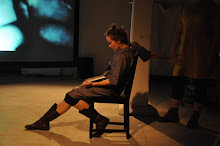I witnessed an understudy performance of Clemenza di Tito yesterday afternoon, behind the Harris Theater mainstage. It was produced by the various assistants (to the conductor, the director, even the rehearsal pianist) who get together with the understudies to the main roles, and in the space of one week develop their own reading of the opera. But there are caveats. The performance lasts one hour, instead of two and a half. And there's no stage, no backstage, and no lighting. The performance happened in a kind of dance/conference room with space enough for about twenty people, two upright pianos, a handful of chairs, classroom track lighting, a trashcan, a clock, bad ventilation, and a couple exit signs. In other words, a lot like the last place on earth you'd wanna sing an opera. Unless you're Peter Sellars. (His infamous Marriage of Figaro, set in New York City's Trump Towers, substituted an uncomfortable opera-in-your-dorm-room kind of thing for the stop-everything-and-just-sing decor typical of a [say, 1998] Met production of the opera.)
R.B. Schlather, who assisted Christopher Alden on the set for Tito, did a good job of using what he had, i.e. next to nothing, rather than fighting it. Characters who were supposed to be offstage either sat lifeless at the long conference table planted in the center of the room, or huddled in the weird, dark exit corridor at the back. Rabihah Davis sang Vitellia's last aria (which maybe ought to have been sung from inside the corridor) slouched against the long dance mirror stage left, playing with her reflection. It was a nice effect, since Vitellia at this point literally retreats into a world of her own. Other characters, with no recourse to escape heady dramatic confrontations, occasionally turned face-first into the wall and remained there in an abrupt gesture of total helplessness.
The scenes that worked against the anti-operatic qualities of the room were less successful. In the finale, Sesto is about to be condemned to death and he/she simply walked up to the table and laid down on it. It would have made more sense, given the space, if he had been condemned to a paper shredder and a Kafka-esque never-ending stack of bills. No one, to my dismay, pointed a gun at the microwave, threatened to tear down the clock (which ticked and shuddered noisily throughout the entire "production"), or shouted at the pianist, who was four feet away, to play play more like an orchestra. There wasn't actually a microwave, but you see my point.
Ultimately, the condensed aspect of the performance was its most bizarre feature. How do you slim down a Mozart opera to one-third its original size? The production team solved this dilemma by eliminating everything except the recitative until halfway through Act II. At that point the characters suddenly began singing arias, precipitating a swift return to operaland. The problem with recitative-only opera is that Tito, Mozart's late return to buffa style, depends for its effectiveness on moments of pause -- the arias, which give space to thoughts and feelings. With nobody pausing for reflection, with nobody pausing, period, the characters ran around for the first forty minutes speaking very quickly to one another like they were acting out some weird Italian theatrical form that died out centuries ago because it didn't make any sense.
Especial pplause is due to Julia Hardin, who played Sextus like a champ, especially given the circumstances.
Subscribe to:
Post Comments (Atom)




No comments:
Post a Comment